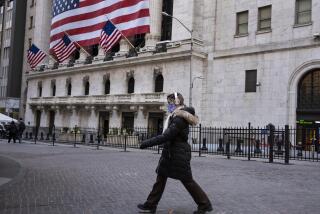Oil climbs above $110 on Libya, Mideast unrest
- Share via
Crude rose above $110 a barrel for the first time in 30 months as a fire burned at Libya’s Sarir oilfield, bolstering concern that unrest in North Africa and the Middle East will spread, curbing shipments.
Futures climbed 1.4% after NATO said forces loyal to Muammar Qaddafi caused a fire at the field, according to Al Arabiya television. The conflict in Libya is currently in a stalemate, said Army General Carter Ham, the U.S. commander for Africa. Revolts have led to the overthrow of governments in Egypt and Tunisia and targeted regimes from Syria to Bahrain.
“The situation in Libya, and issues elsewhere in the Middle East, offer a chance to buy the rumor,” said Sarah Emerson, managing director of Energy Security Analysis Inc. in Wakefield, Massachusetts. “There’s a tremendous upward momentum and I see nothing in the near-term to stop the rally.”
Crude oil for May delivery rose $1.47 to $110.30 a barrel on the New York Mercantile Exchange, the highest settlement since Sept. 22, 2008. Futures are up 28% from a year ago.
Brent oil for May settlement increased 37 cents, or 0.3%, to end the session at $122.67 a barrel on the London- based ICE Futures Europe exchange. It was the highest settlement price since Aug. 1, 2008.
Japan Aftershock
Prices briefly slipped after a magnitude-7.1 aftershock, one of the strongest since the devastating earthquake March 11, struck Japan today 215 miles (345 kilometers) northeast of Tokyo. The quake was measured at a depth of about 25 miles and occurred at about 11:32 p.m. local time, the U.S. Geological Survey reported on its website.
The aftershock was the fourth of magnitude-7 or higher since March 11, according to the Japanese Meteorological Agency. The largest measured 7.7, about 30 minutes after the record quake, the agency’s website showed.
“The road to recovery in Japan has just become harder,” said Carl Larry, president of Oil Outlooks & Opinions LLC in Houston. “Japan doesn’t seem safe and we will see more expats leaving the country. Economic growth will take another hit, which is detrimental for demand.”
Abdeljalil Mayuf, a manager of information for the Arabian Gulf Oil Co., which manages the Sarir field, said the facility had been attacked by forces loyal to Qaddafi and not by a British jet, according to Reuters.
“It looks like Qaddafi’s forces are beginning to implement a scorched-earth policy,” said Phil Flynn, vice president of research at PFGBest in Chicago. “Some of our worst fears are being realized.”
Libyan Output
Libya’s current crude output is between 250,000 barrels and 300,000 barrels a day, all of which goes to domestic refineries and to meet local consumption, Shokri Ghanem, chairman of the state-run National Oil Corp., said in a telephone interview from Tripoli.
North Atlantic Treaty Organization jets flew 164 missions over Libya yesterday, including 73 “strike sorties” to engage possible targets as part of its air campaign, the military alliance said in a statement posted on its website. Those numbers compare to 155 missions and 66 strike sorties the previous day.
The Organization of Petroleum Exporting Countries will cut crude-oil loadings for a ninth week as Libyan exports drop, according to tanker-tracker Oil Movements. The group will ship 22.98 million barrels a day in the four weeks to April 23, down from 23.36 million barrels in the period ended March 26, the Halifax, England-based consultant said in a report today.
Worst Possible Scenario’
“The news from Libya, and of a possible stalemate, is the worst possible scenario for the oil market,” said John Kilduff, a partner at Again Capital LLC, a New York-based hedge fund focusing on energy. “It brings back images of the period when there were sanctions against Saddam Hussein. Iraqi exports were erratic and the industry declined.”
The United Nations imposed sanctions against Iraq in 1990 after President Saddam Hussein invaded Kuwait. They were lifted in 2003 after a U.S.-led invasion overthrew Hussein’s regime.
Oil also climbed after the U.S. Labor Department said applications for unemployment insurance declined by 10,000 to 382,000 last week, the fewest since Feb. 26. Economists projected jobless claims would be little changed at 385,000, according to the median estimate in a Bloomberg News survey.
“We’re continuing to chug ahead after briefly panicking this morning on the Japanese earthquake,” said Gene McGillian, an analyst and broker at Tradition Energy in Stamford, Connecticut. “The falling jobless numbers are another sign that the economy is continuing to improve. Worries about the Middle East and Nigeria are also pushing prices higher.”
Nigerian Ballot
Nigeria, Africa’s biggest oil producer and most populous nation, scheduled parliamentary elections for April 9 and an election for president on April 16. Elections in 2003 and 2007 were marred by violence, voter intimidation and the stuffing of ballot boxes.
Oil volume in electronic trading on the Nymex was 613,575 contracts as of 3:06 p.m. in New York. Volume totaled 522,046 contracts yesterday, 36% below the average of the past three months. Open interest was 1.57 million contracts, the highest level since March 15.
More to Read
Inside the business of entertainment
The Wide Shot brings you news, analysis and insights on everything from streaming wars to production — and what it all means for the future.
You may occasionally receive promotional content from the Los Angeles Times.









